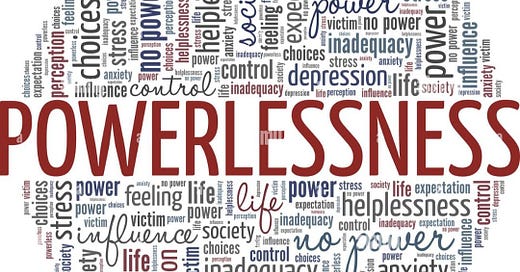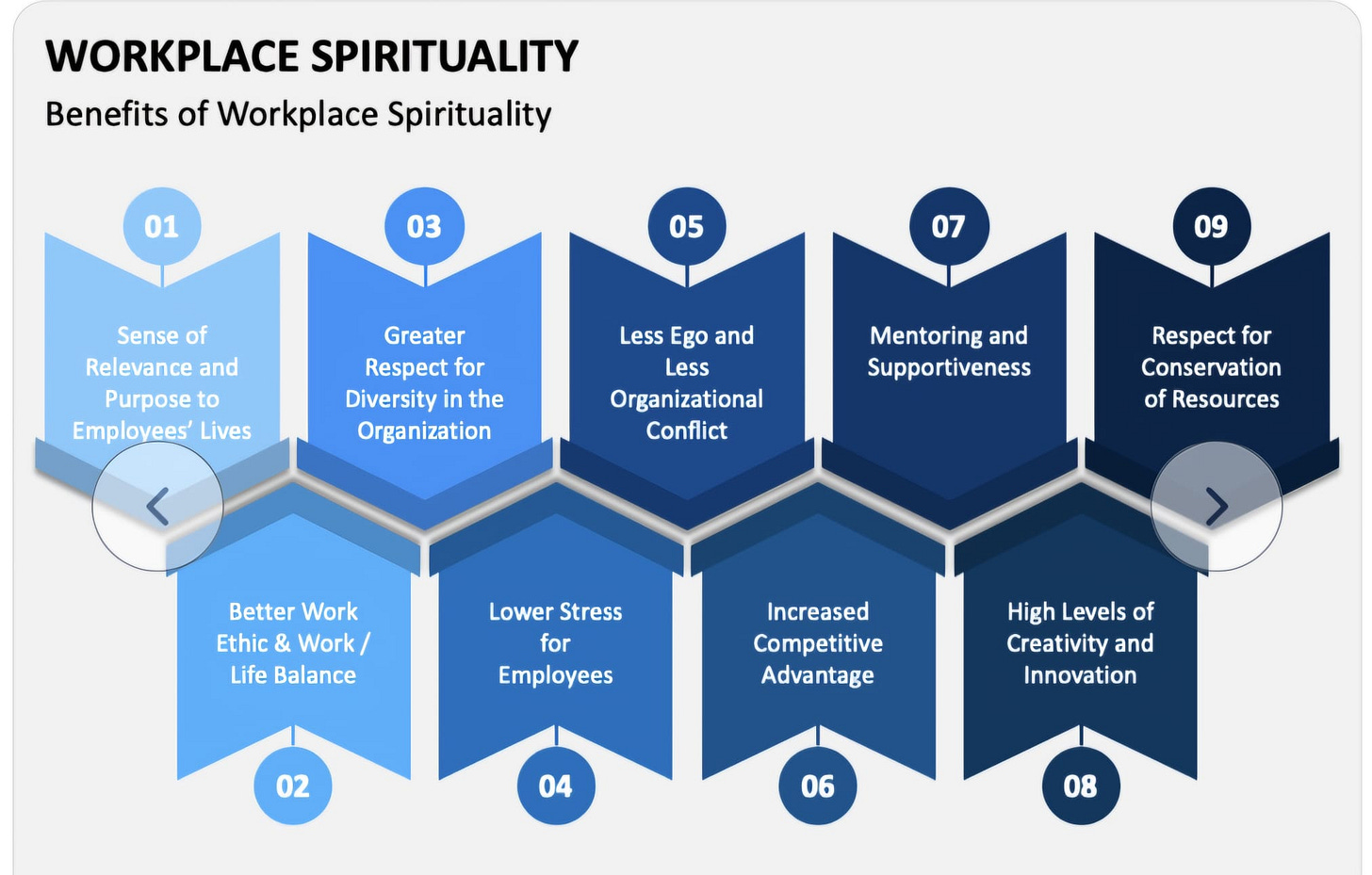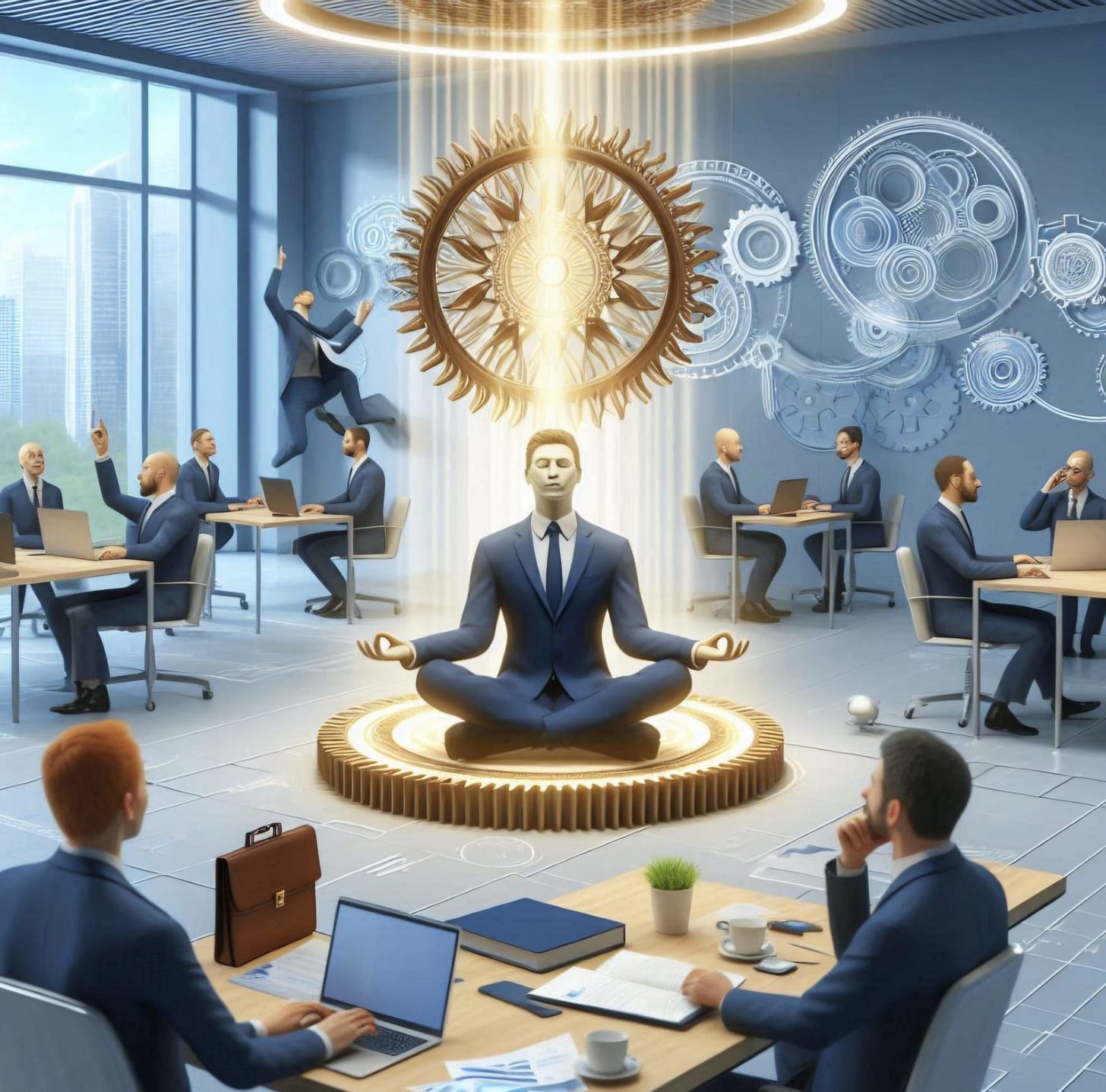Beyond the symptoms of Burnout: Is Powerlessness the Cause of the Workplace Spiritual Malady?
My Masters Thesis Revisited. Life Reimagined, Principles Applied, Flourishing Achieved. What I learned in the Boardroom, the Bar and the Books.
Distilling a lifetime of research and observation into an 8,500 word document was hard enough. Not as challenging at surviving the experience though.
After 20+ years as a workplace consultant - with corporates, for corporates, I have seen it all. I worked in the trenches of high-pressure environments, celebrated the highs of peak performance and witnessed the soul-crushing lows of toxic human behaviour at the most senior levels. I saw good people burn out, tune out, and check out. I saw ambition dwindle into anxiety and drive descend into despair.
Having left the corporate world behind, my own journey into real recovery could begin. It was in this process of healing that my senses beyond the physical five kicked in. Seeing clearly for the first time in years, probably ever.
The patterns I saw in addiction—the feelings of powerlessness, the spiritual void, the desperate need for a real solution—were the very same patterns I witnessed for two decades in our workplaces.
The "Great Resignation" wasn't just about people wanting more money or a better work-life balance. It was a symptom of a much deeper problem: a spiritual malady at the heart of modern work. And the solution isn't another wellness app or a one-off mindfulness workshop. It's something far more profound, practical, and proven.
It certainly isn’t inserting trained Mental Health First Aiders whose primary goal is to drive profit by ticking a box to get on more tenders. This is the response I was met with when offering to deliver a 3 month program of Wellbeing Strategy (Post Pandemic) of Needs Analysis and proven methods from Positive & Coaching Psychology - FOR FREE.
Are you a business owner? Would you say ‘no’ to this? (I made no mention of Workplace Spirituality or Powerlessness in my pitches. After all - Wellbeing was the buzzword - hard enough to sell a solution to the blinkered.)
The Real Red Flag We're All Ignoring: Powerlessness
Forget engagement scores for a moment. The single most corrosive feeling in any workplace is powerlessness.
It’s the feeling that you have no control, no voice, and no real choice. It's being micromanaged on projects you're an expert in. It's seeing decisions made that contradict common sense and company values. It's the slow, draining realization that your efforts don't truly matter.
Psychologists call the result of this sustained powerlessness "ego depletion"—a state where your mental and emotional resources are so drained that you lack the energy to engage, solve problems, or even care. It’s not laziness; it’s a depleted spirit. My research highlighted that this is the breeding ground for:
Burnout: Not just being tired, but emotionally exhausted and cynical.
Anxiety and Depression: The constant stress erodes mental health.
Unethical Behavior: When needs are thwarted, people can act out of character.
Compensatory Habits: Turning to addictions (workaholism, substance use, etc.) to numb the pain or feel a sense of control.
Our workplaces are suffering from a disease of the spirit and it's costing us everything.
The Surprising Solution: What Work Can Learn from Recovery
This is where my worlds collided. In recovery, the first step is admitting powerlessness. Only then can a true transformation begin. This transformation is guided by a set of 12 Spiritual Principles—simple, actionable concepts like Honesty, Hope, Humility, and Service.
These aren't abstract religious ideas. They are a practical design for living that restores a person's inner resources.
At the same time, decades of psychological research from Drs. Ryan and Deci's Self-Determination Theory (SDT) proves that humans have three core psychological needs to thrive:
Autonomy: The need to feel in control of our own lives and decisions.
Competence: The need to feel effective and capable.
Relatedness: The need to feel connected to others in a community.
Here is the connection my research illuminates: The 12 Spiritual Principles from recovery are a real-world engine for fulfilling the core psychological needs of Self-Determination Theory.
Honesty and Courage build Autonomy by allowing us to show up as our authentic selves.
Patience, Integrity, and Self-Discipline build Competence as we master our actions and contributions.
Brotherly Love, Willingness, and Service build Relatedness by fostering genuine fellowship and unity.
When people in recovery practice these principles, they move from a state of depleted powerlessness to a state of vitality and purpose. Imagine if our organizations did the same.
How to Create a Workplace That Heals, Not Harms
This isn't about holding 12-Step meetings in the boardroom. It's about integrating the principles into the very fabric of how we work. It’s about creating an environment of what your research calls "Spiritual Fitness."
For Individuals: How to Survive and Reclaim Your Power
If you feel trapped in a toxic environment, you are not the problem. But you can start reclaiming your spirit.
Practice Rigorous Honesty: Start with yourself. What do you truly need? Where are your boundaries being crossed? Acknowledge the reality of your situation without judgment.
Seek Fellowship: You cannot do it alone. Find trusted colleagues, mentors, or friends who you can speak openly with. Problems attract company; solutions are built in community.
Focus on Service: Shift your focus from what you can get to what you can give. Helping a colleague, mentoring a junior, or simply offering a kind word builds competence and connection, refilling your own energy reserves.
For Leaders: How to Build a Thriving Organization
Your role isn't to "fix" people. It's to create the conditions for them to thrive.
Admit "Organizational Powerlessness": Be humble. Acknowledge that the old ways of top-down control are failing. Be vulnerable enough to say, "We don't have all the answers, and we need to find a better way together." This act of leadership creates immense trust.
Champion Autonomy: Stop micromanaging. Trust your people. Give them clear goals and the freedom to figure out how to achieve them. True autonomy isn't chaos; it's empowered responsibility.
Build True Fellowship, Not Forced Fun: Ditch the superficial team-building exercises. Create genuine opportunities for connection where people can share their strengths, hopes, and struggles. Foster a culture of "systemic feeling" where the collective emotional health of the team is a priority.
Embrace the Serenity Prayer: As a leader, your job is to have the serenity to accept the things you cannot change, the courage to change the things you can, and the wisdom to know the difference. Stop trying to control everything. Focus your energy on removing the barriers that are depleting your team's spirit.
See below - this IS NOT Workplace Spirituality!
The Final Word
For decades, we’ve treated employees as resources to be managed. We’ve built systems of control that, despite best intentions, have created widespread spiritual and psychological distress.
My work and research point to a more human, more effective path. A path where we recognize that every employee has an inner life that needs to be nourished. Where we understand that building a community of empowered individuals is not just the right thing to do—it's the only way to achieve sustainable, high performance.
It's time to stop tinkering with the symptoms of burnout and address the root cause. It's time for a workplace spiritual awakening.
If you recognise yourself or your organisation in this research - Let’s connect.








Let's connect on LinkedIn if you'd like to know more about these experiences and qualifications xxx
https://www.linkedin.com/in/elizabeth-reece-msc-appcp-emcc-icf-af-26357a14